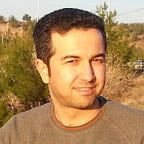Wounded Kurdish Fighter Says Islamic State Controls Just Five Percent of Kobani
Turkey helps injured Kurdish troops as U.S. air strikes start to work
Chiya Kobani, a 34-year-old guerrilla from the Syrian-Kurdish YPG group, was wounded in the ongoing battle for Kobani, a Syrian-Kurdish town near the border with Turkey. Now he’s stuck in Turkey, unable to return to his comrades.
But he had some good news for War Is Boring when I met him on the Turkish side of the border on Oct. 14. “Only five percent of Kobani is under Islamic State control,” he said.
It seems U.S.-led air strikes are finally helping the Kurds to turn the tide of the battle in Kobani, five weeks after militants first laid siege to the town.
Chiya told me that was injured while fighting militants on Moshtennor Hill near Kobani. His comrades brought him to Turkey on Oct. 4. He ended up at the hospital in Suruc.
“I stayed seven days in the hospital, then I ran away,” he said. “Kobani’s pain was in my heart.”
He said he has difficulty walking because of his wound. But he insisted he must return to the battle. “I promised my friends who had been martyred in front of my eyes that if I died, I would die defending Kobani.”
Some Turkish officials regard the YPG and the affiliated PKK as terrorist groups. Turkish president Recep Tayyip Erdogan has publicly criticized the YPG, insisting it’s no better than Islamic State.
But it seems the Islamist menace has compelled Ankara to compromise. I asked Chiya how he was able to get treatment. “Turkey didn’t create any problems for us,” he said, “because our friends in North Kurdistan [Turkey] managed everything for us in the Suruc hospital.”
By “friends,” he meant the Kurdish People’s Democratic Party based in Turkey.
Chiya said that American jets didn’t truly start attacking Islamic State positions until Oct. 10, nearly a month after the militants first threatened the town. Chiya said that at first the Americans were bombing empty fighting positions.
“If the jets had bombed Islamic State positions, Islamic State fighters wouldn’t have been able to resist for even two days,” Chiya said. And when the warplanes’ targeting improved starting around Oct. 9, the militants gave up all but five percent of Kobani, according to Chiya.
Our conversation was interrupted by a phone call to Chiya. A friend from Kobani was calling him. “Whatever happens, and no matter how, I will come back to Kobani today,” Chiya told his friend on the phone. He’d tried returning before, but the Turkish army had stopped him.
Chiya put the phone on loudspeaker so I could hear. His friend said that they had killed four Islamic State fighters and were in possession of their bodies, weapons and passports. Chiya seemed happy to hear that.
Then another friend spoke to Chiya … in Arabic. Chiya explained that the YPG was working with the Shams Al Shimal Battalion of the Free Syrian Army. The Syrian friend said that he would stay and fight in Kobani even if he were the town’s last defender.
The same day at Suruc hospital, an ambulance brought five wounded YPG fighters from Kobani—two women and three men. A doctor at the hospital clarified that the hospital staff who are taking care of the wounded fighters are mostly Kurds from different areas of Turkey.
The doctor, who requested anonymity, said that the staff had set up tents on the hospital’s front yard in case the hospital fills up. “Most of the fighters are treated in our hospital, but if there is any critical condition they will be referred to Urfa or Diyarbakir,” he said.
Though Turkish authorities have tacitly allowed the hospital to help the Kurdish fighters, the Turks make it clear that they’re still in charge.
“A few days ago, the Turkish government took a wounded fighter from this hospital at 4:00 a.m.,” said another source at the hospital. “That Kurdish fighter from Turkey had joined the PKK a long time ago and had been wounded in Kobani. He entered Turkey with the ID of a man from Kobani.”
The source said that when Turkish intelligence learned of the deception, agents came and took the man away. His whereabouts are unknown.
